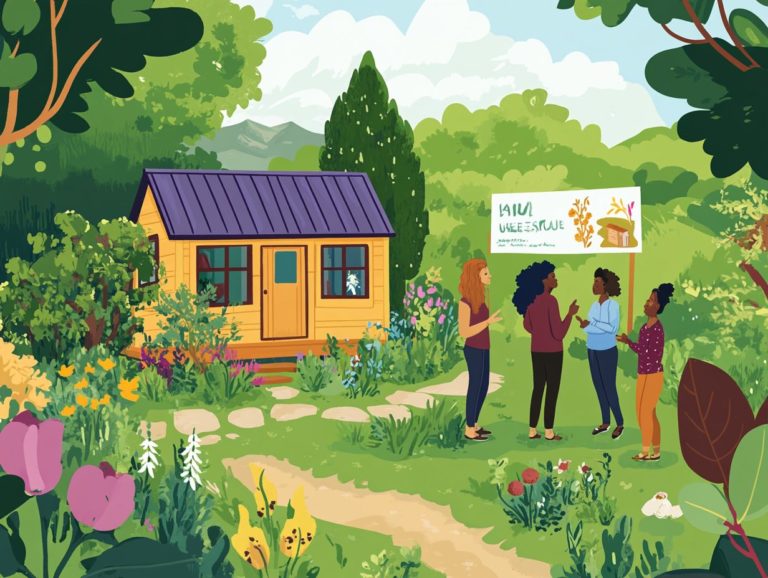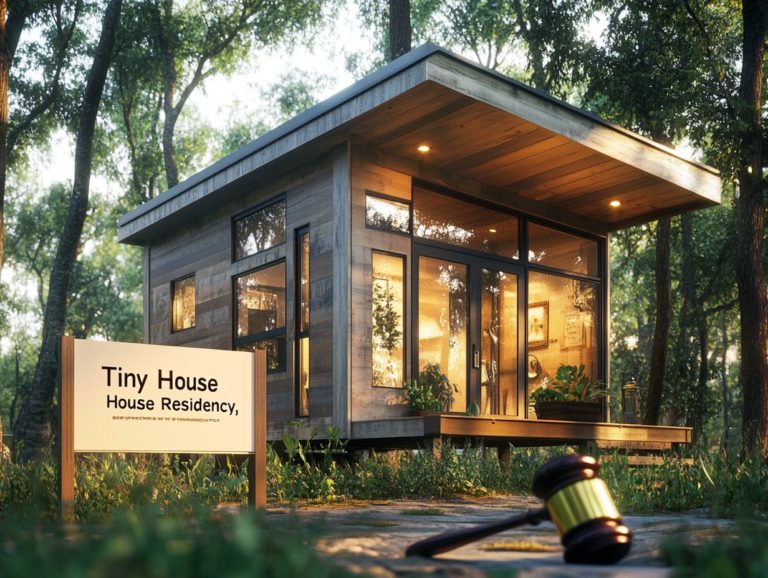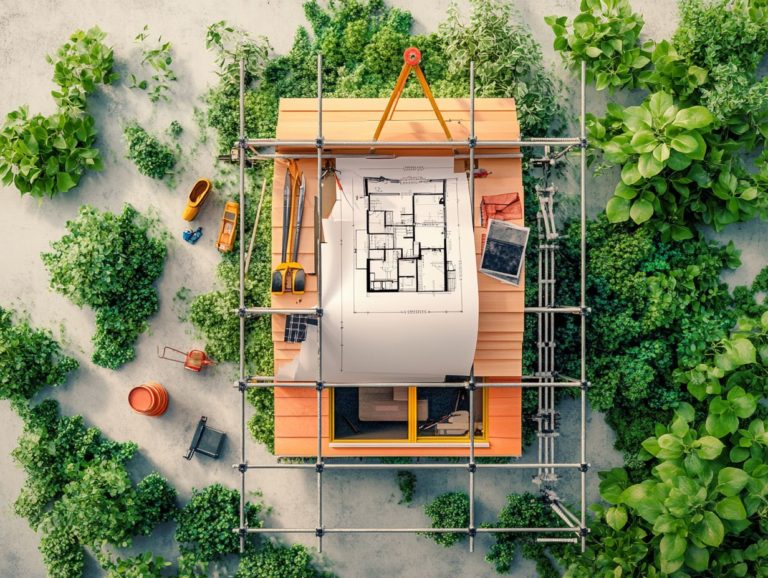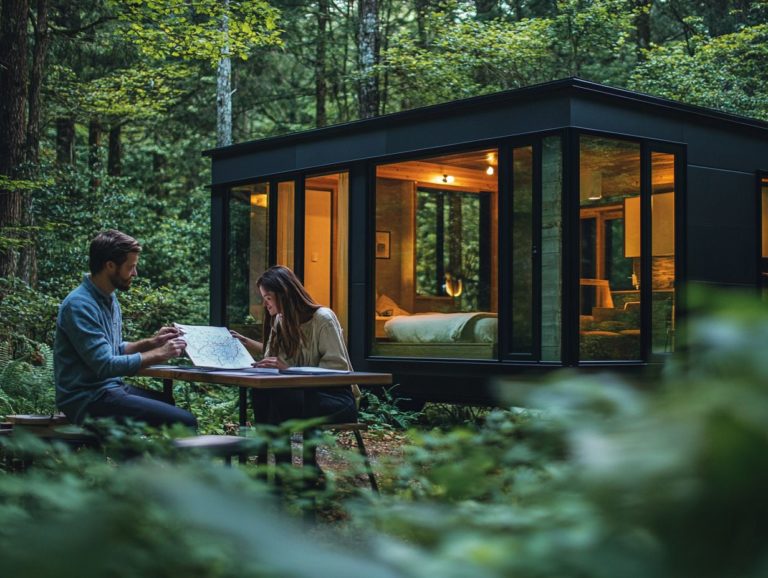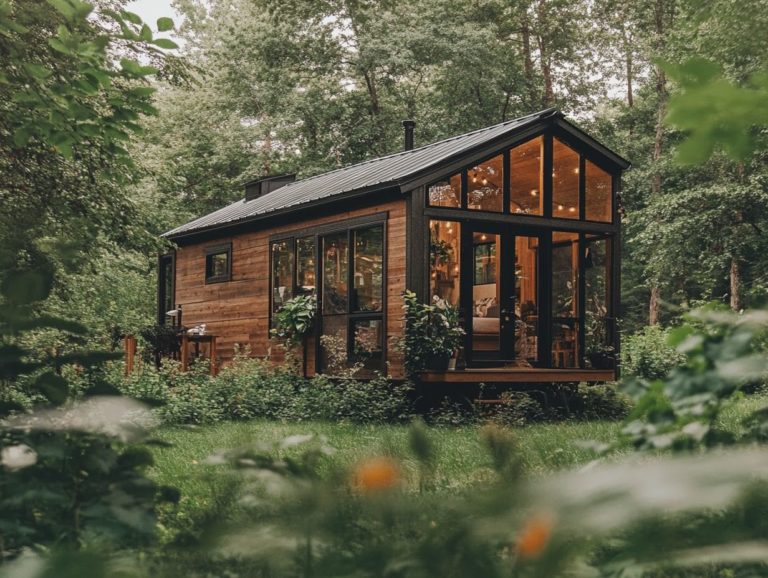Tiny House Ownership: Legal Tips for Newbies
Tiny house ownership is rapidly gaining traction as a lifestyle choice, offering a captivating blend of minimalism, sustainability, and financial freedom.
Before you embark on this transformative journey, you need to know what a tiny house truly represents and how it stands apart from traditional homes.
This guide delves into the legal considerations of tiny house ownership, covering everything from zoning laws to insurance options. You ll also uncover practical tips for securing the ideal legal parking space for your tiny home.
Whether you re a seasoned minimalist or a curious newcomer, this guide will equip you for your tiny house adventure.
Contents [hide]
- Key Takeaways:
- Understanding Tiny House Ownership
- Legal Considerations for Tiny House Ownership
- Navigating Insurance and Financing for Tiny Houses
- Tips for Finding Legal Parking for Your Tiny House
- Frequently Asked Questions
- 1. What exactly is a tiny house and how is it different from a traditional home?
- 2. Do I need a special permit or license to own and live in a tiny house?
- 3. Can I park my tiny house anywhere I want?
- 4. Do I need to pay property taxes for my tiny house?
- 5. Can I get a mortgage for a tiny house?
- 6. Are there any legal concerns I should be aware of before purchasing a tiny house?
Key Takeaways:
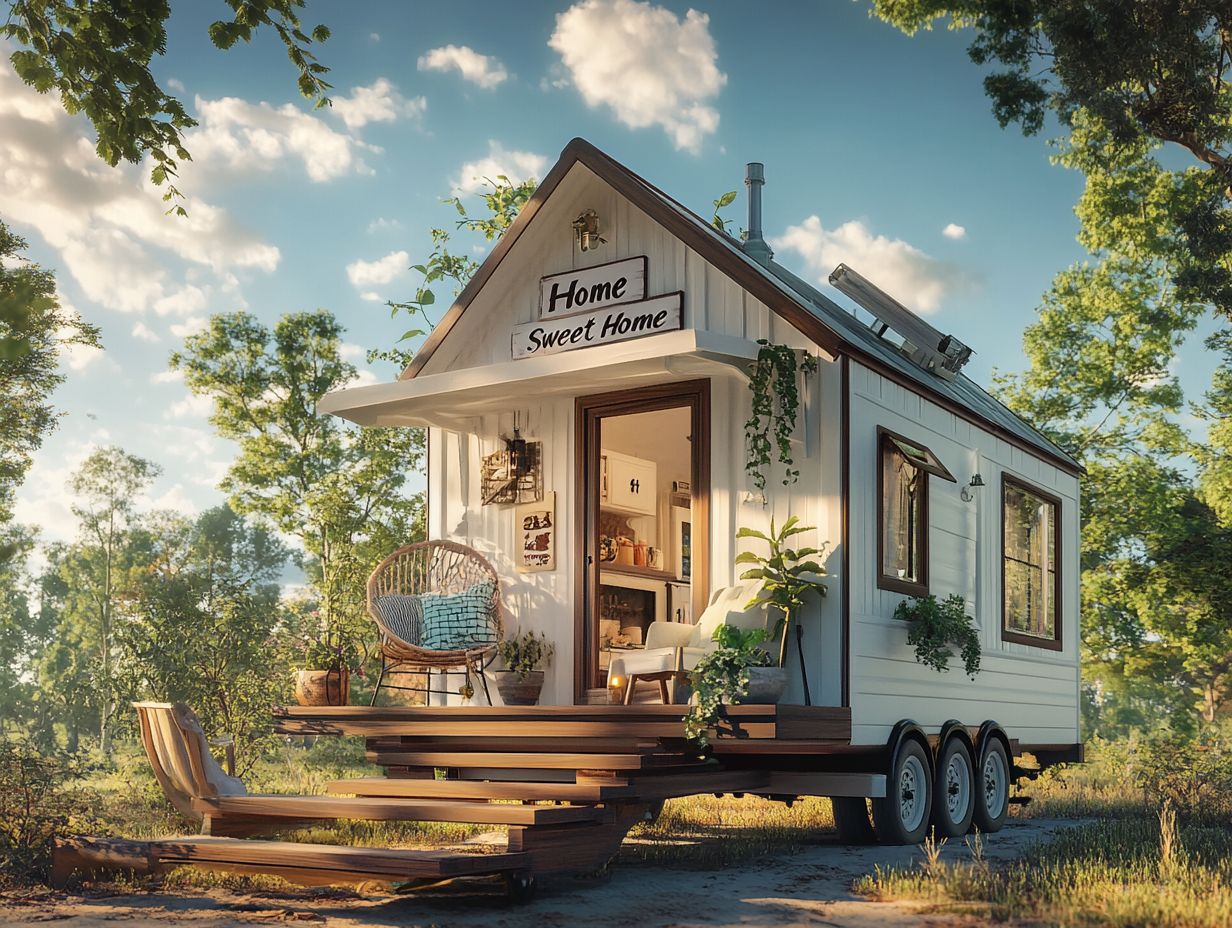
- Understand the difference between a tiny house and a traditional home size and mobility are key factors.
- Be aware of zoning laws and building codes they may dictate where and how you can live in your tiny house.
- Explore insurance and financing options for your tiny house they can provide security for your investment.
Understanding Tiny House Ownership
Owning a tiny house lets you discover the many facets that set tiny homes apart from traditional residences. The tiny house movement has gained remarkable momentum, particularly during the pandemic, when many sought financial freedom and a simpler way of living.
Typically ranging from 100 to 400 square feet, tiny homes are often crafted with eco-friendliness in mind. They offer a variety of construction styles and amenities to align with diverse preferences.
As you contemplate your home-buying options, the tiny house lifestyle emerges as an appealing alternative, significantly reducing ongoing costs like property taxes and maintenance expenses.
What is a Tiny House and How is it Different from a Traditional Home?
A tiny house is a compact dwelling, typically ranging from 100 to 400 square feet, crafted to maximize space and embrace a minimalist lifestyle. This approach stands in stark contrast to traditional homes, which often exceed 1,000 square feet.
These miniature abodes frequently integrate eco-friendly features like solar panels, rainwater collection systems, and sustainable materials, enabling you to reduce your carbon footprint significantly. The design principles emphasize functionality, showcasing multifunctional furniture and ingenious storage solutions that ensure every inch is put to good use. If you’re considering a tiny house, be sure to understand tiny house rental agreements and legal tips that can help protect your investment.
Common amenities in tiny houses include compact kitchens, lofted sleeping areas, and well-designed bathrooms. These features are all tailored to provide comfort without the unnecessary excess of larger homes. This shift in living space fosters a more sustainable and financially savvy lifestyle while encouraging you to cultivate a deeper connection with your surroundings, promoting experiences over mere possessions. However, it’s important to be aware of tiny house zoning issues to make the most of your living situation.
Legal Considerations for Tiny House Ownership
Embarking on the journey of tiny house ownership requires you to navigate a complex web of legal considerations, especially concerning zoning laws and building permits that can vary dramatically by location. Grasping these regulations is essential for anyone eager to join the tiny house movement, as they determine where and how you can legally position your home.
Land ownership and parking arrangements are also crucial in maintaining compliance with local laws. It’s wise to consider the implications of personal property taxes, as these can significantly impact your financial decisions. Additionally, understanding legal obligations for tiny house owners is essential to ensure you meet all necessary requirements.
Zoning Laws and Building Codes
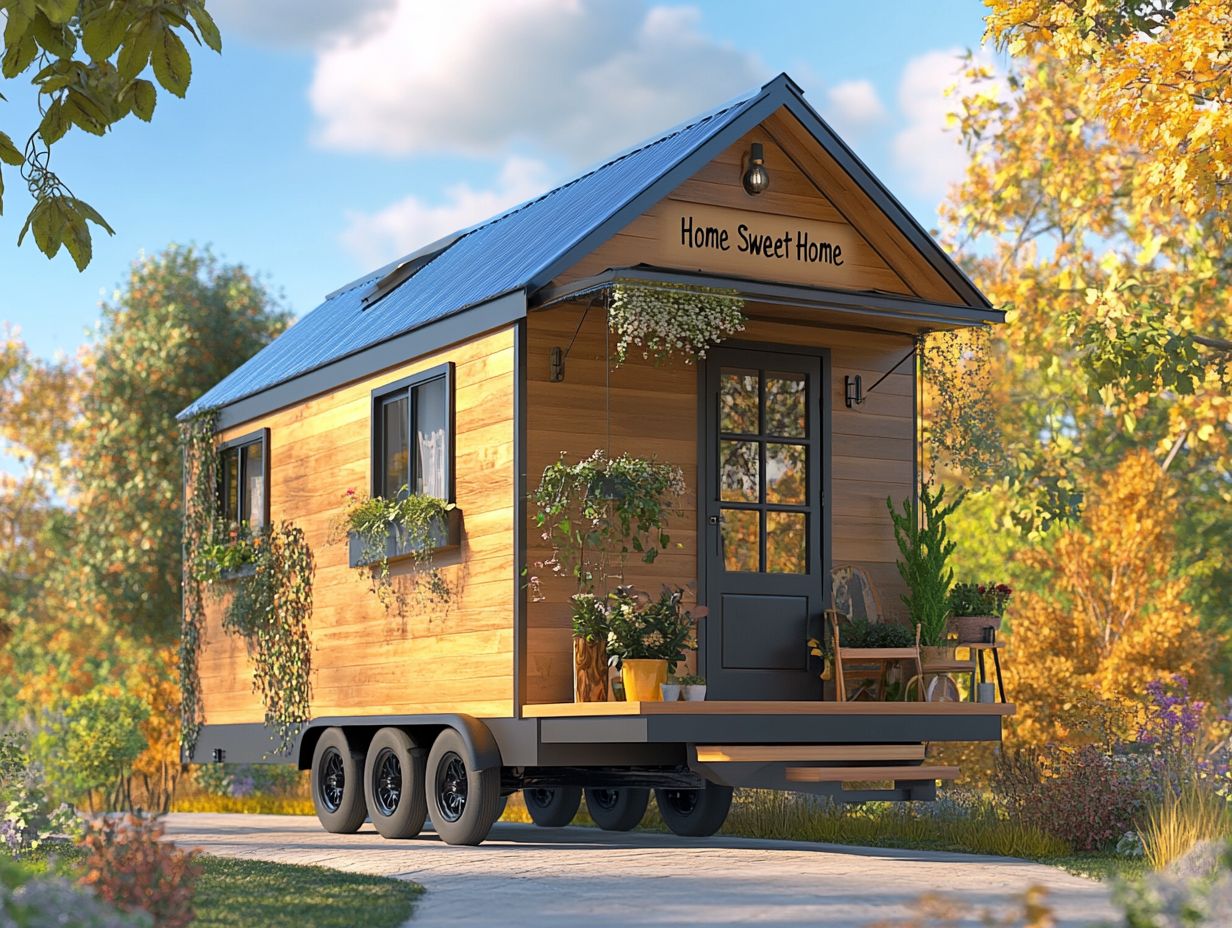
Zoning laws and building codes are key factors that dictate where you can place your tiny house and how to construct it. These regulations often present challenges for anyone interested in the tiny house movement.
They vary significantly by location and affect everything from the size and design of your home to the land uses permitted in your area. Some municipalities may allow tiny homes on wheels as temporary dwellings, while others classify them strictly as recreational vehicles, leading to additional restrictions. Understanding the legal guidelines for tiny house parking can help navigate these regulations more effectively.
Building codes dictate the safety standards you must follow, covering everything from insulation to plumbing. Research your local zoning regulations thoroughly to navigate these complexities, and seek guidance from legal experts.
Obtaining the necessary permits usually requires careful examination of both zoning laws and building codes. You may need to submit detailed plans and possibly attend public hearings.
Land Ownership and Parking
Choosing the right land for your tiny house is crucial. Land ownership and parking options can greatly influence your tiny house living experience and legal compliance.
Navigating land ownership avenues is vital for anyone contemplating this lifestyle. Whether you decide to purchase land outright, explore rental agreements, or consider mobile home parks, each option has unique advantages and challenges.
Finding suitable parking for tiny houses is extremely important. It requires thoughtful consideration of both temporary and permanent solutions. Remember to adhere to local regulations, keeping in mind zoning laws and land use restrictions that could steer your decisions. Additionally, it’s crucial to understand what to know about tiny house land leases to ensure compliance and make informed choices.
Navigating Insurance and Financing for Tiny Houses
Navigating insurance and financing options for tiny houses is crucial for prospective owners. Securing the right coverage and selecting appropriate financing can significantly impact your ownership experience.
Insuring Your Tiny House
Insuring your tiny house is an essential step in safeguarding your investment. It often requires a solid understanding of specialized insurance policies tailored to the unique aspects of tiny house living.
Since tiny homes differ from traditional houses in structure and mobility, various insurance options are available. Coverage can include homeowners insurance for permanent structures or mobile home insurance for those who frequently move their homes. Additionally, it’s essential to understand the tiny house residency laws you should know to ensure compliance with local regulations.
Challenges like lower property values and varying local regulations can affect your coverage options. That’s why consulting with an insurance agent who specializes in tiny house ownership is crucial. Their expertise will help you navigate these hurdles, including understanding tiny house land use laws, and secure the right protection for your investment.
Financing Options for Tiny House Ownership
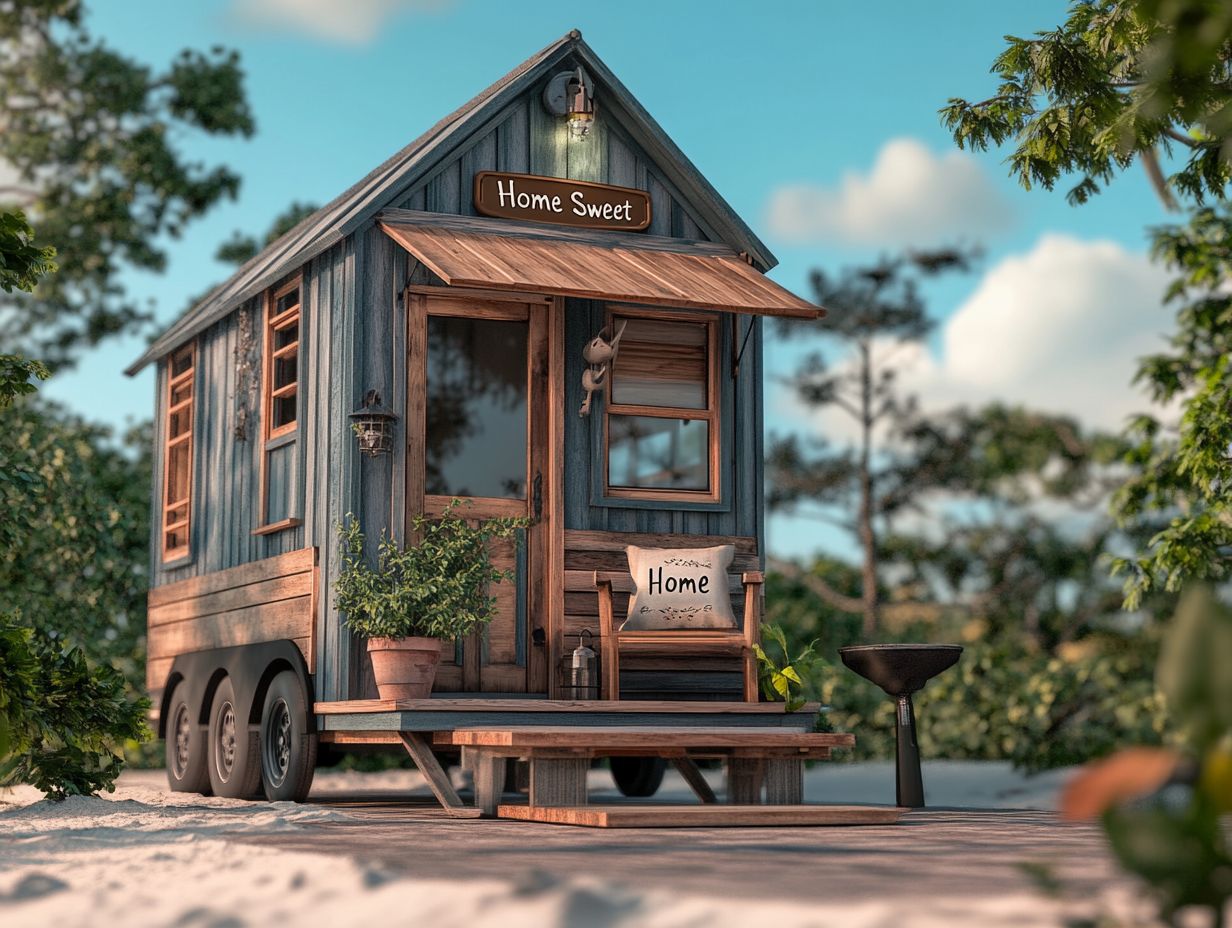
When considering financing options for tiny house ownership, explore various avenues, including specialized tiny house loans designed for this lifestyle.
These specialized loans offer greater flexibility compared to traditional mortgages, which often come with stricter requirements. Personal loans can also be a good alternative if you want to sidestep lengthy mortgage application processes.
Know your credit score; it affects your interest rates and loan eligibility. Also, consider how personal property taxes may influence your monthly payments and overall budgeting.
By carefully weighing these factors, you can make informed financing decisions that align with your tiny house dreams.
Tips for Finding Legal Parking for Your Tiny House
Securing legal parking for your tiny house can feel like an uphill battle, especially within the nuanced landscape of the tiny house movement. You need to understand zoning laws and permits carefully, making it essential to navigate these regulations with care and foresight.
Options for Parking Your Tiny House
You have a variety of options for parking your tiny house, each coming with its own set of legal considerations. Think about mobile home parks, private land, or designated tiny house communities.
Finding the right choice requires balancing legality, community acceptance, and your personal lifestyle preferences. To navigate these legal aspects, consider understanding the legal status of tiny houses. Mobile home parks often provide a straightforward route for parking, but they can impose strict regulations that might feel constraining.
On the flip side, private land offers you flexibility and privacy, though finding a willing landowner can be a challenge. Tiny house communities tend to cultivate a sense of camaraderie and support, but you might encounter waiting lists or uniform requirements that could impact your individuality.
Each option affects your legal standing and social environment, key to your tiny house experience.
Important Factors to Consider
As you search for legal parking, focus on zoning laws, site access, and ownership issues. Evaluating these factors can help you make informed decisions.
Evaluate the distance to grocery stores, public transport, and recreation areas. This proximity can significantly elevate your daily living experience.
Understand community regulations on noise and mobile living to avoid conflicts.
Think about the long-term effects of your parking choices. Settling in one location could impact your overall lifestyle flexibility and financial freedom, so choose wisely.
Frequently Asked Questions
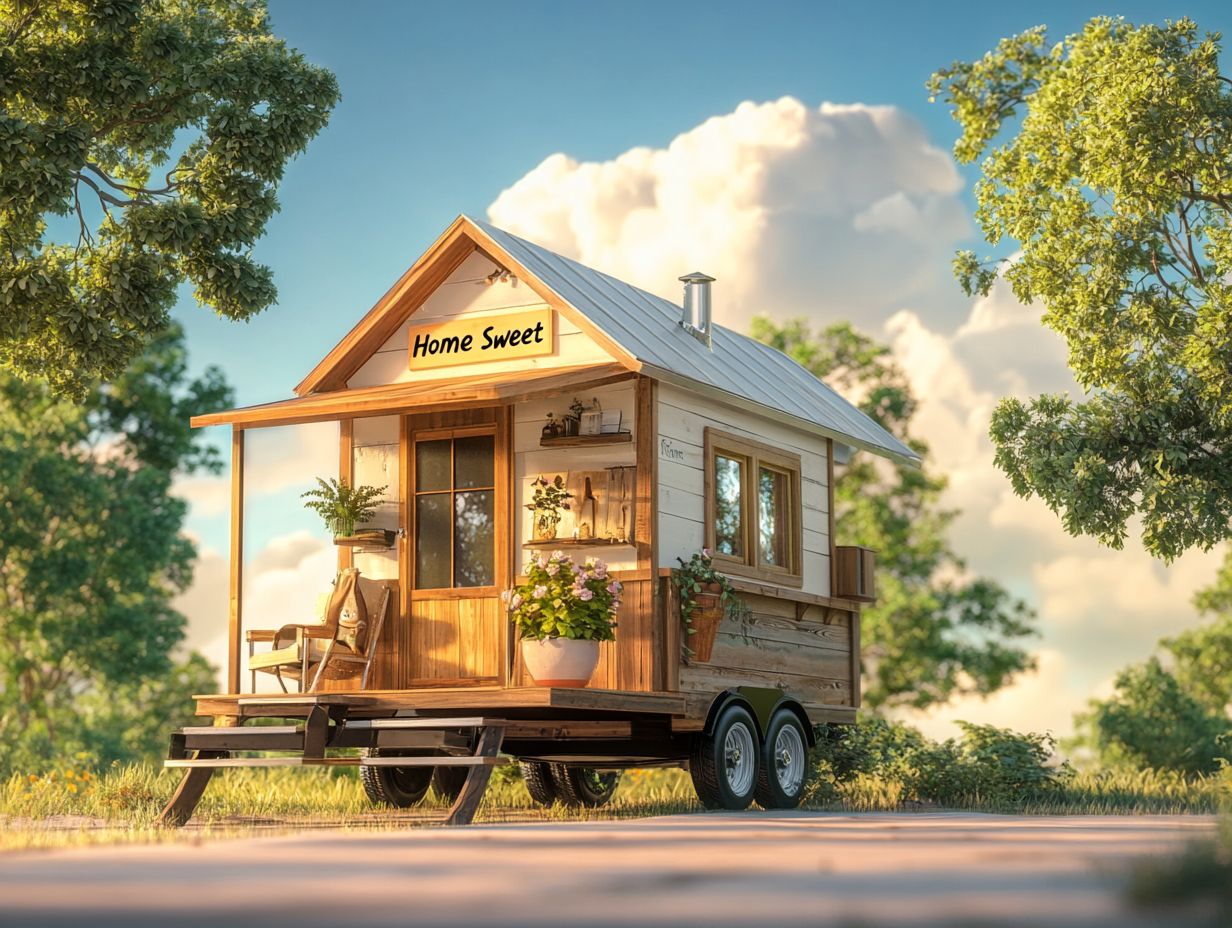
1. What exactly is a tiny house and how is it different from a traditional home?
A tiny house is a small dwelling, typically under 400 square feet, designed to be a more affordable and sustainable living option. It’s different from a traditional home in terms of size, cost, and design.
2. Do I need a special permit or license to own and live in a tiny house?
This depends on where you live. Some areas have specific rules for tiny houses, while others may consider them as accessory dwelling units. It is important to research and check with your local government for any necessary permits or licenses.
3. Can I park my tiny house anywhere I want?
Unfortunately, no. Most areas have zoning laws and regulations that restrict where you can park and live in a tiny house. It is important to research and understand these laws before purchasing a tiny house.
4. Do I need to pay property taxes for my tiny house?
Yes, just like any other type of home, you will be responsible for paying property taxes on your tiny house if it is considered a permanent structure. However, if your tiny house is classified as a recreational vehicle, you may not be required to pay property taxes.
5. Can I get a mortgage for a tiny house?
It is possible to get a mortgage for a tiny house, but it can be more challenging than getting a mortgage for a traditional home. Many banks and lenders are unfamiliar with tiny houses and may not be willing to provide a loan. You may have better luck with a personal loan or financing through a tiny house builder.
6. Are there any legal concerns I should be aware of before purchasing a tiny house?
Yes, there are several legal considerations to keep in mind when buying a tiny house. These include zoning laws, building codes, insurance requirements, and potential issues with utilities and financing. It is important to do thorough research and consult with legal professionals to ensure a smooth and legal ownership process.

